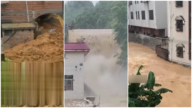【新唐人2014年04月15日訊】甘肅省蘭州市自來水「苯」含量嚴重超標事故,爆發至今已有5天,然而,有關水污染的真正原因,蘭州官方的說法一改再改,民眾莫衷一是。而針對市政府宣稱,自來水已恢復正常,仍有不少民眾質疑,不敢貿然飲用。
10號下午5點,蘭州市唯一的一家水廠——蘭州威立雅水務集團公司,測出出廠的水「苯」含量高達每升118微克,到11號凌晨2點,已增為每升200微克,是國家規定的安全標準 ——每升10微克的20倍。
13號,蘭州市政府表示,蘭州「威立雅水務集團」公司的自流溝周邊有大量的地下含油污水,是這次自來水「苯」超標的直接原因。
《每日經濟新聞》引述環境應急專家組成員王金生的話表示,蘭州自來水中的「苯」,來源於「中國石油蘭州石化公司」上世紀80年代發生洩漏事故後,滲入到地下的污染物。自流溝到壽後,收縮縫老化,滯留區的含「苯」地下水,通過收縮縫進入自流溝,進而污染到水質。
不過,蘭州環保局長閆子江對媒體說,「中石油」蘭州分公司一條管道發生原油洩漏,污染了供水企業的自流溝,導致蘭州自來水「苯」超標。
而《人民日報》則指出,經甘肅省環保廳環境監測站監測,蘭州自來水「苯」超標主要原因,是水廠泵房實施清洗作業所致。
另外,《中國經營報》報導說,自流溝附近有很多的化工企業,「苯超標」是這些化工企業肆意排污造成的。
甘肅省蘭州市飯館店員:「我們光看新聞,一會兒說這,一會兒說那,我們也不知道(污染源),老百姓能知道啥,這得你們媒體去挖掘真正的原因,不管甚麼污染,受害的還是老百姓,其實政府部門應該跟老百姓說清楚,到底是甚麼污染。」
13號下午1點,檢測數據顯示,蘭州「威立雅自來水廠」1號泵房「苯」含量,已降到每升2.74微克,2號泵房「苯」含量也只剩每升1.72微克,不過,在發生「苯」污染的蘭州西固區,仍隨處可見排著長隊取水的民眾和一些歇業的飯店。
據了解,此次檢測出「苯」超標的自流溝,位於「蘭州石化」廠區附近,建成投用至今已近60年,承擔著全市90%生活飲用水的輸送任務。
飯館店員:「影響就是,吃飯的人少了唄,現在水不是可以用了嗎,我們也是聽人家說可以用了,反正現在我們就吃了,中沒中毒﹖我們也不知道。這人家不是都說是慢性毒藥,對人身體致癌,這都知道!新聞上都說著呢,微信上都傳著那個!」
針對自來水「苯」含量,在短短几天內大幅下降,「重慶食品工業研究所」副所長周令國指出,消除「苯」含量要靠水體的自然流動。
重慶食品工業研究所副所長周令國:「那就看那個水是流動的,還是死水,流動不大,它怎麼排出啊,流水可以稀釋,把它稀釋了,把它衝擊走。水自己不能排出苯。它是個化學物質,生物一吃掉它,要毒死的。」
北京水污染民間水專家張峻峰,則提出幾個導致苯大幅下降的可能原因。
北京民間水專家張峻峰:「肯定它的取水口轉變了,或者水的來源,比如污染體,給停止排放了,有這樣的新聞之後,他害怕,也有可能是某一些人,個別的,把一些苯的東西倒入了水裡面,就造成了污染。它不可能是長期性的,長期性的早就發現了。它一定是一個臨時性的,像這個突發事件,要嘛是工廠洩漏,一種是人為的傾倒。」
10號下午5點,「威立雅公司」就發現自來水有「苯」超標現象,不過,蘭州市政府直到11號上午11點,才發佈自來水不宜飲用通告,足足延遲了18個小時,引發民眾質疑。事實上,上個月10號,就有市民向當局反映水有異味,結果被當局以「網路造謠」刑拘。
據了解,中石油管道之前多次發生「滲油現象」,早在2011年5月,上海《東方早報》就曾深入報導蘭州地下油污管道超期服役,存在安全隱患的問題。
採訪/朱智善 編輯/陳潔 後製/陳建銘
Lanzhou Drinking Water Polluted with Excessive Benzene
For five days, excessive benzene has been detected in Lanzhou’s
drinking water.
However, officials have not given a confirmed explanation
for the pollution.
People hesitate to use the water even though the official claims
the water is clear of all pollutant.
At 17:00 on March 10, Lanzhou water plant of Lanzhou
Veolia Water Company,
found 118 micrograms of benzene per liter of water and 200
micrograms per liter at 2:00 on March 11.
This makes it 20 times the national safety standard,
with 10 micrograms of benzene per liter of water.
Lanzhou municipal government said, the benzene came
from oily wastewater.
According to Wang Jinsheng, local environment task force
member, Lanzhou Petrochemical Co is to blame for the pollution.
The oil leak in the 80s seeped into the ground and has re-emerged
as the aging of retention to the area, polluting the water sources.
However, Lanzhou environmental protection bureau
Yan Zijiang said,
that the oil has leaked through a pipeline of Lanzhou
Petrochemical Co,
contaminating the water supply with
excessive benzene.
The People’s Daily reported that Gansu Provincial Environmental
Protection Bureau,
has identified the water plant pump room cleaning operation,
resulted in the contamination of the water supply.
In addition, China Business said the arbitrary discharges from
chemical companies surrounding the gravity flow
channels, are the cause of excessive benzene.
A Lanzhou restaurant clerk: “We don’t know the exact cause of
the pollution. The media needs to find out for us.
We are the victims. The government should explain to us."
At 13:00 of April 13, benzene levels at Lanzhou Veolia Water Plant
at pumping station one,
had dropped to 2.74 micrograms per liter, and 1.72 micrograms
per liter at pumping station two.
However, local residents are still lining up to pick up water.
Restaurants are also closed due to the water problem.
It is said that the gravity flow channel with excessive benzene is
located near the Lanzhou Petrochemical plant.
This particular channel has supported 90 percent of all drinking water
in Lanzhou for nearly 60 years.
Restaurant clerk: “It affects business, a lot less people will
come to the restaurant.
Now we just use the water no matter if it is poisonous or not,
the government said it is ok.
According to a news report and WeChat, It was said there is a chronic
and cancer causing poison in the water."
Regarding the significant drop of benzene levels in the
last few days,
Chongqing Institute of Food Industry deputy director
Zhou Lingguo pointed out,
benzene elimination depends on the
water’s natural flow.
Zhou Lingguo, Chongqing Institute of Food Industry deputy
director: “The flowing water can dilute it, but the
near static water can not.
The water itself can’t discharge it.
It is a chemical which kills."
Beijing water pollution expert Zhang Junfeng explains some
possible reasons for the sharpl decrease in benzene levels.
Zhang Junfeng, Beijing water pollution expert: “Surely they
have changed the water source or stopped using the polluted sources.
Maybe someone has poured the pollutants in to the water recently.
I don’t think its been there long very long;
otherwise it would have been found long ago.
It’s just temporary or an incident resulting from a plant leak
or personal dumping."
Veolia water company found excessive benzene in the water
At 17:00 of April 10.
However, Lanzhou municipal government did not issue the
warning of not to use the water until 11:00 am of April 11.
That was a delay of 18 hours.
People questioned a smell in the water was reported
on March 10.
The authorities did nothing but arrest the person who complained
about the smell on charges of ‘Internet rumors’.
It is said there were many oil leaks in the Petrochemical
oil pipelines.
On May 2011, Shanghai Oriental Morning Post, reported
about hidden risks of the aged Lanzhou underground oil pipelines.
Interview/Zhu Zhishan Edit/ChenJie Post-Production/Chen Jianming





























